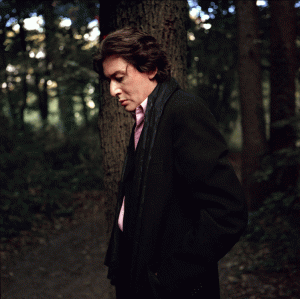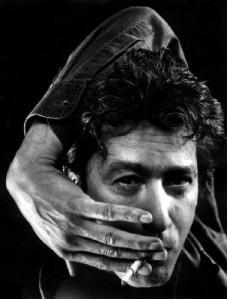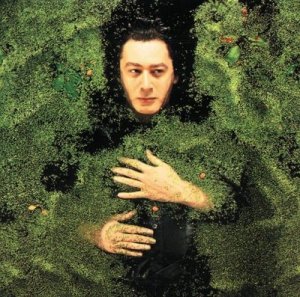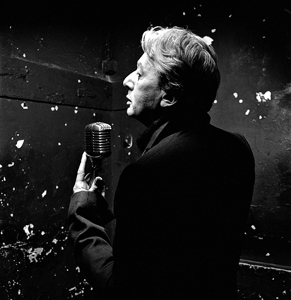
I have a rather bad habit of discovering a new artist, buying one of their records, promptly falling in love and then absorbing the rest of their back catalogue in the space of a week. It’s a bad habit. It’s gorging. It causes indigestion. You end up missing the nuances, the hidden textures. And then I get full, I can’t stand anymore and I cast my new favourite aside.
I have nearly committed that sin again this week, taking in four Alain Bashung albums since last Monday. I have decided to stop, four albums in, so I don’t have his entire discography on my shelves two weeks after hearing his name. Stop and consider. Ruminate on what I’ve heard. And what I have heard is frankly quite amazing.
Alain Bashung is a name lost to most English people. He hasn’t entered the British cultural lexicon in the same way he bear hugs the French cultural lexique. He now, most probably never will, having died earlier this year, too young at the age of 61. Lung cancer gets even the cool, from time to time, after a lifetime of cigarettes.
He is in many ways the successor to Serge Gainsbourg, who was himself the successor to George Brassens and many others, the line stretching back to the conception of the French love song, the chanson. A word that can strike fear into some. People hear it and think of Charles Aznavour and his unique brand of cod emotion, Jacques Brel and his wonderful mouth frothing gurgling, spread eagled over swells of strings and crashes of percussion cascading out of the Olympia. They associate it with Edith Piaf, for being the irrepressible Edith Piaf.
Alain Bashung is Chanson updated. Its Chanson with the gentlemanly lilt removed, absent are the lounge suit, cigarette and obligatory glass of whisky (not always obligatory).This is Chanson with swagger. Sometimes Dylanesque, sometimes Punk, sometimes orchestral and sometimes electronic in a way that you never thought the French could muster.
In the 80’s he was heavily influenced by British-post punk and New Wave releasing a string of critically and popularly acclaimed albums such as 1979’s Roulette Russe and 1980’s Pizza. His 1983 album Figure Imposee saw him collaborating with his hero Serge Gainsbourg, setting him on an experimental path from which he wouldn’t relent. Except for Passe le Rio Grande in 1986 which directly followed the former and was a last ditch attempt to regain popular appeal. The album saw Bashung coating his songs in synths and appearing on the cover in a kind of New Romantic style pose, that ended up making him look like a cross between Boy George and Julian Clary.
But it his album Fantasie Militarie, that is often considered his “masterpiece”, it is difficult to track down, especially if you don’t want to pay shockingly erratic sums. I ordered it cheep of Amazon France, for a pocketful of Euros, only for it to be dispatched from Halifax. How that works I have no idea.
 The album is a cacophony of styles from sweeping strings and confessional melodies to electronic landscapes and modern day Scott Walker experimentalism. Backed by many famous musical luminaries including Adrian Utley from Portishead, Bashung displays so many musical styles that it is quite extraordinary. On some of his albums his style turns on a sixpence. Take his early 90’s album Chatterton, which see’s a number of experimental electronica tracks, complete with solo David Sylvianesque trumpet flourishes, but then begins to develop Country style tinges as the album concludes. A bizarre twist, dubbed by the French press as “New Wave Country”.
The album is a cacophony of styles from sweeping strings and confessional melodies to electronic landscapes and modern day Scott Walker experimentalism. Backed by many famous musical luminaries including Adrian Utley from Portishead, Bashung displays so many musical styles that it is quite extraordinary. On some of his albums his style turns on a sixpence. Take his early 90’s album Chatterton, which see’s a number of experimental electronica tracks, complete with solo David Sylvianesque trumpet flourishes, but then begins to develop Country style tinges as the album concludes. A bizarre twist, dubbed by the French press as “New Wave Country”.
I love the French language, it’s graceful and beautiful to enunciate, but after numerous attempts to try and master it, my efforts tend to become mired in the fine details of feminine and masculine verbs and the like. Throw that kind of confusion in with my sometimes rather strong northern accent and I end up sounding a little bit like John Prescott mixed with an intoxicated Alain Delon. Par-laay-vuwe, eh up-eh-up.
I can however deceiver some of the lyrics and they prove themselves to be inventive, mysterious and wry. For example the bridge in his hugely successful (in France) single Osez Josephine goes “A l’arrière des dauphines, Je suis le roi des scélérats, A qui sourit la vie” which roughly translates as “Standing behind the Dauphins (medieval French princes) I am the king of the villainous. At whom, life smiles”.
You have to hear the song to get it, the rocky melody, which is complemented by  extravagant guitar riffs. It’s also got a wonderful video, featuring Bashung playing guitar in an Elvis costume accompanied by a beautiful woman, in the middle of a circus ring, while a white horse gallops around the arena edge. Baffling, yet so original.
extravagant guitar riffs. It’s also got a wonderful video, featuring Bashung playing guitar in an Elvis costume accompanied by a beautiful woman, in the middle of a circus ring, while a white horse gallops around the arena edge. Baffling, yet so original.
Being able to understand the lyrics of course has no real bearing on whether you like a song, the only bellwether is for lyrics to sound genuine, to sound like the singer is trying to emote something that they desperately want you to hear. Bashung has a kind of threatening intimacy, even in his more upbeat songs there is a sense of foreboding and when his emotions do cascade forward like in Fantasie Militarie’s Le Nuit Je Mens, it produces an extraordinarily high voltage moment. The same is true even in his more experimental work such as on 2002’s crtically acclaimed album L’imprudence.
He was certainly a cool character’ of that there seems to be no doubt, weather posing for photographs smoking a cigarette upside down, or growing vegetables in a Parisian rooftop garden, amid the chimney pots and spires, he seems to have had a certain presence. A kind of “Fuck You” attitude reigns thought-out his work and life. The French generally have an air of “Fuck You I’m better”, but it’s usually sugar-coated in corduroy and whispers. Here it’s straight up. In your face. Fuck You.
 He died earlier this year on the 14th March. It passed me by to be honest at the time, although France was apparently plunged into a state of mourning and his funeral attended by the cultural who’s who of Gaul. It’s easy to say these days, in a knee-jerk reaction to the sometimes superfluous culture of today, that there are no living icons anymore, that they’ve all long since departed and all we’re left with is a second class art, that can only try and live up to what’s gone before. Sometimes I feel tempted to agree. But then you discover someone like this, an icon, up until a few months ago, a living icon, who sailed completely under my radar, yet utterly revolutionised his home culture. The greats are still there, you just have to look a little harder to find them.
He died earlier this year on the 14th March. It passed me by to be honest at the time, although France was apparently plunged into a state of mourning and his funeral attended by the cultural who’s who of Gaul. It’s easy to say these days, in a knee-jerk reaction to the sometimes superfluous culture of today, that there are no living icons anymore, that they’ve all long since departed and all we’re left with is a second class art, that can only try and live up to what’s gone before. Sometimes I feel tempted to agree. But then you discover someone like this, an icon, up until a few months ago, a living icon, who sailed completely under my radar, yet utterly revolutionised his home culture. The greats are still there, you just have to look a little harder to find them.
Hi Robert,
Great to see that Alain Bashung is known outside France.
Thank you for this beautiful text.
One thing about ” à l’arrière des Dauphines”. You must know that the “Dauphine” was a very popular car in the France of the sixties. So I think the right translation would be “on the backsit of the dauphines, etc…”
Hi Robert,
thank you for your little biography on Alain Bashung. I also ‘discovered’ him recently.
His music has struck me and will not leave me.
greatings,
Janique
The Netherlands